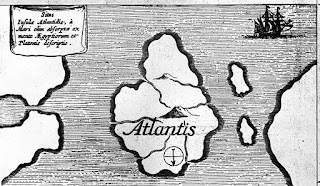Plato, the famous Greek philosopher, was the only source of all information about the lost continent race and in the mean time, many experts made several theories about the age and position of Atlantis, however nobody is really sure what really happens to the civilization itself. In his dialogues 'Timaeus' and 'Critias', the story of Atlantis was revealed. A lot of Plato's work were fictional, but the story of Atlantis was stated as a fact. Around 600 BC, in one of his dialogues tells the story of a Greek scholar named Solon who travelled to Egypt to learn about the ancient world. The Egyptians were famous with their knowledge and records dating back centuries, and as Solon tried to impress his hosts with tales of Greece's achievements, the wise old Egyptian priests revealed a story about a continent and a people with advanced technology called Atlantis which is disappeared mysteriously in one night.
 |
| Image Credit: 100 Strangest Mysteries by Matt Lamy page 77 |
He describes the continent with a few detail. It was about 435 miles across, with mountains and a great central plain. The central acropolis was guarded by mighty walls protecting each ring of intervening land by concentric rings of canals. A massive canal connected the circular moats with the ocean to the south, and all the commerce of the world passed up and down the great waterway. At its height, Atlantis was a glorious Bronze Age civilization, with a mighty army and fleet, rich in natural resources and wealthy from the trade of nations.
Plato also describes how Atlantis was created: Poseidon, god of the sea, took it for his own when the gods of Olympus were carving up the world, and he shaped it according to his needs. His children (the eldest of whom was Atlas) became the kings of the land and ruled according to his precepts. In a familiar tale of decline, however, they became morally corrupt and debased as their wealth and power increased, and so the gods visited disaster upon them, smiting the land with a great earthquake that caused it to sink beneath the waves, becoming an impassable mud shoal that hindered free transport between the Mediterranean and the Atlantic. These arguably shaky foundations have given rise to many libraries' worth of speculation from ancient times until the modern day.
Whilst Plato's story was well known, the renewed modern interest in Atlantis began in 1882 with the publication of Atlantis: The Antediluvian World by a former US congressman, Ignatius Donnelly. Donnelly's book was a mixture of conjecture, misinterpreted fact and actual history. But there were some interesting ideas; he noted similarities in the science and culture of native races which apparently could never have met. Likewise, the great ancient flood, which is said to have destroyed Atlantis, is logged in ancient writings and traditions of peoples around the world.
As evidence for his theory, Donnelly pointed to ancient transatlantic cultural similarities such as pyramid building and sun worship, claiming that Mayan petroglyphs and Egyptian hieroglyphs both stemmed from the Atlanteans, who invented writing (along with astronomy, metallurgy, glass, the compass and various other attributes of civilisation). Donnelly pointed out that many cultures shared myths of great floods and migrant culture heroes who founded civilisations. He also claimed that many plants and animals on either side of the Atlantic were obviously related, pointing to the existence of a now-submerged land bridge across the ocean.
There are theories that Sardinia in the Mediterranean, and the island of Thera in the Aegean Sea, could be Atlantis. Both had highly-evolved civilisations: the Nuraghi people on Sardinia and the Minoan culture on Thera. Both also suffered terrible natural disasters. But neither of these islands are westwards of the Straits of Gibraltar, so to accept them is to doubt Plato's geography. Also, the advanced races on these islands disappeared about 900 years before Plato - he stated that Atlantis became extinct 9,000 years before him.
References :
- 100 Strangest Mysteries by Matt Lamy;
- Lost Hitories : ”Exploring The World’s Most Famous Mysteries” by Joel Levy









Please don't put your website link in Comment section. This is for discussion article related only. Thank you :)